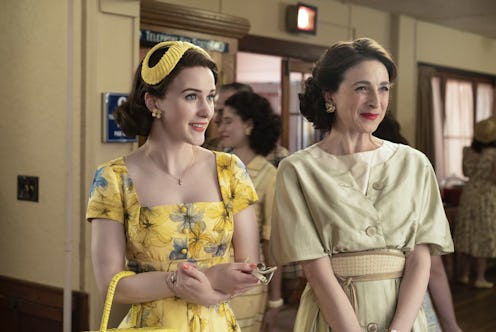Entertainment
'Maisel' Season 2 Actually Has A Lot To Say About How We Can Be Better Feminists In 2018

If Season 1 of The Marvelous Mrs. Maisel was about discovery, Season 2 is about evolution. Midge is finding her footing after an increasingly complicated separation; Rose is finally asserting herself; Susie is moving forward in a career she never thought she’d have. All of the women in Season 2 of The Marvelous Mrs. Maisel are beginning to embrace feminism — or at least the loose concept of it — but each in their own way.
Let's start with Midge, who's had one hell of a year. After her husband, Joel, left her for his secretary, she fell haphazardly into a burgeoning stand-up career, unlocking a part of herself that had always been there, but that she'd not fully acknowledged. This is a woman who is (or was) the very definition of a '50s housewife: she used to measure every part of her body before she went to bed, then go to sleep late and wake up early so that Joel would never see her without makeup. But in Season 2, she's a career woman, commanding stages while deftly navigating the misogynist world of comedy. Of course, it's not always easy. When, amid a particularly vulgar set, Abe finds out that Midge has been secretly nursing a stand-up act, he demands, by the power vested in him as her father, that she not tell anyone what she's doing.
Many women today would politely (or maybe not-so-politely) tell their father that it's up to them to decide how and when to tell people, but 1959 Midge, as liberated as she is or is becoming, can't say no to Abe. He is the head of her household, even though she's been married and is a grown woman with two children. Midge may be asserting herself in the world and in the workforce, but she still has reservations about living alone and giving up the life society has told her she's meant to have. Though she's perhaps done the most growing of the bunch, Midge still has steps to go. She's still unsure of what's on the other side — and whether or not she's equipped to handle it.
Meanwhile Rose, Midge's mother, has always had very traditional ideas about what it means to be a woman. But Season 2 finds her pushing against the very rules she's long abided by. In the premiere, she's living in Paris, where she's moved because Abe doesn't pay attention to her, and perhaps because some part of her also feels restless or unfulfilled. In Paris, she lives alone. She has a dog. She shares a bathroom — all things American Rose would never deign to do. She says it best when Midge tells her that she missed her. "I missed me, too," Rose responds.
Rose is a new woman in Paris, but ultimately, she acquiesces to her husband and heads back to the States. Abe explains that their life is not in Paris; their life is in New York. And Rose, like Midge, isn't really ready to give up her role as wife and mother, because if she was, she would have said "see ya" to Abe and stayed in her arrondissement. But Rose does bring some of her new self back to America. There is a particularly spirited exchange between her, Abe, and the head of the art department at Columbia, as Rose scolds him for selling women on the idea that they could one day be teachers or artists, when Columbia itself hasn't bothered to hire any female professors.
Between Seasons 1 and 2, Rose has certainly embraced more independence, but she's still holding tightly to the ideas of womanhood that have, for most of her adult life, defined her. Rose is grounded by her family, so when she tries to focus on something else completely, she falls off-kilter. Midge, in comparison, is able to throw herself completely into her comedy without thinking about how it affects her family (for better or worse). They're on similar journeys, Midge is just a little more willing — which does make sense, given the generational gap.
And then there's Susie, Midge's manager, who is probably the most "modern" of the women on the show. She works. She lives alone. She just does her own thing, navigating a new job while trying to stifle a serious case of imposter syndrome, clawing and scratching to find whatever semblance of success society will allow. Would she call herself a feminist? In 1959, probably not. But because Susie doesn’t conform to what people want her to be, she’s the Maisel character with the most autonomy. She speaks to people the way she wants, doesn't chain herself to the rules of femininity, has a job, and is good at it to boot. When she's with Midge, Susie softens, and we see a little more emotion from her than in Season 1. She has a hard exterior, but it's clear she's still in touch with her feelings; she doesn't fall into the archaic, caricaturized, man-hating idea of feminism that existed at the time, even if she does prefer wearing pants.
It would be easy to paint the Maisel women as stereotypes; the '50s are pretty fraught with female tropes. But as a show about one woman — and now several women — discerning their place in the world, it's simply not in Maisel's DNA. Instead, the series delivers three portraits of very different, equally wonderful types of women, each finding her sense of self by her own means. And as women, even now, still wrestle with what does and doesn't constitute feminism, it's an apt reminder that there isn't one definition. We, like the women of Maisel, are paving our own way.